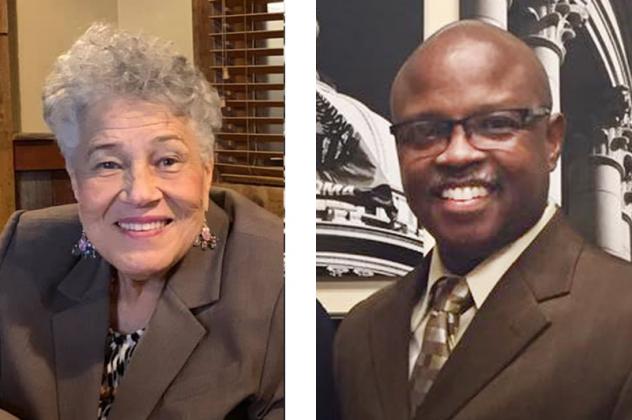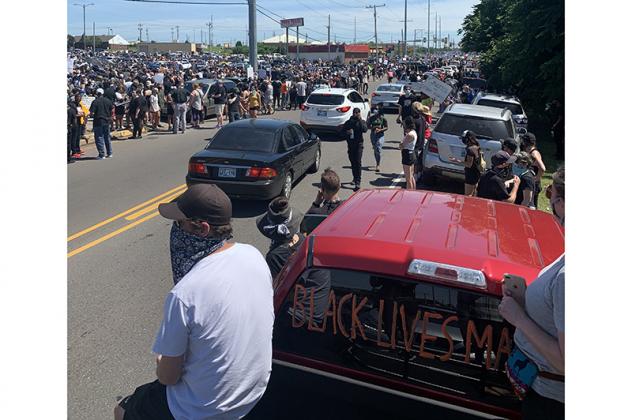‘More Humbleness, Less Selfishness’
Two pastors’ perspectives on current unrest, finding pathways forward
With demonstrations continuing across the country in the wake of the death of George Floyd in Minneapolis, two local pastors agreed to sit down with the Times & Free Press to discuss the situation from their perspectives.
Pastor Eloise Gray
Dover native and Mount Olive Baptist Church pastor Eloise Gray had an entirely different topic in mind when she was first asked to preach last Sunday at the First Baptist Church on North Fifth Street.
But then a black man was killed by a white police officer in Minneapolis and protests erupted in cities across the nation.
“I told them I’m going to be talking about something I had not planned,” Mrs. Gray said. “I told them I have a heavy heart. We lived through the 60s and it’s so sad to see it all happening again – so sad to see what happened to Mr. Floyd.”
Born Eloise Terrell, Mrs. Gray left Dover after she graduated high school to attend college in Pueblo, Colo., where her older brother already lived and worked in a steel mill.
“It was a small junior college and there were very few blacks at that school. I was discriminated against by the blacks because I was light complected and didn’t fit in,” she said. “I was already asthmatic and had a severe asthma attack and they didn’t think I was going to make it.”
At her doctor’s urging and her mother’s insistence, Eloise dropped out and moved to Denver, where she worked at a discount store, one of the first blacks hired by the company. By chance, she met a young airman who was in training school in Denver who stopped by her store to buy a pair of tennis shoes.
“He wrote to his father that he just met the woman he was going to marry, and a few years later, we did get married,” she said.
The Grays were first stationed in Puerto Rico, for what Mrs. Gray jokingly calls “our three-year honeymoon.” And over the course of the next seven or eight years, Mrs. Gray resumed and then completed her higher education.
She earned an associate’s degree in California, a bachelor’s degree in Georgia and a master’s degree in Okinawa, Japan, while also working at each of their posts and raising a daughter and two sons.
While she said she was not directly involved in the Civil Rights movement of the 1960s and 70s, Mrs. Gray said “I had a little bit in me always about working for fairness and equality.”
While stationed at Loring Air Force Base in Maine, Mrs. Gray noticed that the BX (Base Exchange) did not carry black hair and beauty care products or employ black workers.
She waged a campaign for both, demanding that the exchange cater to and employ blacks as well as whites. She not only persuaded the BX to stock products blacks needed, but she also landed herself a job there.
While in Georgia, the Grays were involved in marches against capital punishment, concerned in part about the disproportionate number of black men on death row.
When the Grays were stationed in California, Mrs. Gray was involved in diversity training, first in a junior college and then training school teachers to help their students from different cultures learn to get along.
“It was all about teaching children to respect one another no matter their backgrounds, to gain an understanding of each other’s cultures,” she said.
She also witnessed firsthand the longterm impact of what happens when peaceful protests evolve into violent clashes that literally and figuratively burn neighborhoods to the ground.
“I can remember us coming home on leave and going through Detroit and seeing all the burnout places,” Mrs. Gray said, referring to the devastation left in the wake of the 1967 Detroit riots, among the most deadly and destructive in U.S. history. “And then to go back through five years later and some of those places still are in the same shape. When businesses are already hurting, it takes a long time to come back from that.”
After getting her college degrees, Mrs. Gray worked in child care within the military for the next 20 years.
As his Air Force career was winding down, Gray had the option of going to a post in Washington, D.C., but he declined, saying he needed to get his wife home to Oklahoma to take care of her aging mother.
They came back in 1995 and began attending the rural Dover church of Mrs. Gray’s childhood, the 130-year-old Mount Olive Baptist Church that her mother and grandmother also grew up attending.
That’s where Mrs. Gray first felt the pull toward ministry, a calling that the church’s then aging pastor also recognized and supported. He helped her become ordained and she assumed the pulpit after his death, where she continues to serve.
The Grays also were led to start a mission in Kenya, Africa, that they’ve named Touching the Heart of God Ministries, where they feed and educate hundreds of children.
It’s through that lens of compassion, humility and service that Mrs. Gray is viewing the current conflict.
“I just think we’ve become a selfish nation, a selfish people,” she said. “We’ve been sheltered in for three months during this pandemic and I think it came out even before all this how people are selfish and focus on only how things affect them personally, instead of looking at how others may be suffering.”
She also talked about a void of spiritual leadership to both guide the black protest movement in a positive direction and be a voice for peaceful change.
“We don’t have a Dr. King right now and we desperately need one,” she said.
A strong voice also could call out those who Gray sees as agitators who are”throwing fuel on the fire” by turning peaceful protests into criminal rampages.
“People have already lost so much in this pandemic and then to have all this come on top of that,” she said, referring to businesses that were vandalized, looted and burned.
She led the First Baptist Church congregation in 30 minutes of prayer asking both for peace and for a godly leader to come forward who can provide inspiration instead of provocation.
“We know what’s right and what’s good and acceptable to the Lord,” she said. “Be respectful to one another. That’s the message I give to the little children.
“You have to be respectful and kind.”
Wendell Prim
Don’t respond to anger with anger is the credo that has guided Pastor Wendell Prim of God’s Covenant Church from his school days at Dover through adulthood.
“I had a classmate who called me the n-word, but I called him some things in anger too,” he said. “Today, we’re friends and I don’t have any problem sitting down to lunch with him.”
At the same time, Prim said God’s call for men to be peacemakers involves a greater responsibility than just smoothing over discord.
“As a peacemaker, you’ve got to stir up those who aren’t doing anything about injustice at the same time you are calming down those who are doing the rioting,” he said.
Prim also serves as a Kingfisher city commissioner in addition to leading a multicultural congregation as pastor of his local church.
From that vantage point, he said people who try to pretend that racism and other injustices don’t exist are similar to those who turned a blind eye to the plight of the traveler who was eventually rescued by the Good Samaritan.
“A lot of Christians are not being Christian when they see injustice happening and turn a blind eye,” he said. “Racism exists, but so does sexism and other injustices. It’s not just one race of people that is being hurt.”
The problem with the current level of anger and frustration is that “all sides are looking at it only one way.”
“That’s what anger does to people but I can’t do that. I’ve got to see it from all sides.
“We’ve got to meet in the middle and have a conversation,” he said.
That includes having compassion for what police officers also go through, Prim said.
“I feel for police officers, those that are dealing with whoever the agitators are who are trying to turn this violent and those officers who go to work every day and are just doing their jobs,” he said.
“Their jobs are hard. They see murder all day long, people lying to them all day long, violence all day long.
“Who calms them down?”
Prim said he reaches out to police officers and offers to pray for and with them.
He also leads prayers in his church for the U.S. President, no matter who holds the office.
“I have lost members by saying I’m going to pray for the President,” Prim said. “I lost members when I said I wanted to pray for Obama and then I lost more members when I said I wanted to pray for Trump.”
The answer to prejudice is not anger, it’s reaching out to discover what motivates those beliefs.
“If I’m told someone is prejudiced, I want to get to know the person behind the prejudice,” he said. “That’s how I do. That’s how prejudice can be undone.
“If the person I’m talking to proves me wrong and continues with their racist beliefs and actions, that’s on them.”
Like Mrs. Gray, Prim said an attitude of humility and service can make all the difference in mending fences and countering anger and frustration.
Prim admits that he fights the very human urge to retaliate in kind when someone else treats him unjustly.
“I want to be that better man, but sometimes it’s so hard to do that and it takes God to convict me that’s the right thing to do,” he said.
Prim and his daughter Ashlie attended the rally in Oklahoma City last Sunday and he said he’s hopeful that upcoming panel discussions can continue the positive interactions he observed.
“Our focus needs to be on being proactive instead of reactive, on being neighborly and building those bridges and connections.”
“We have to sit down together and have the tough conversations,” Prim said. “You got a problem with me or anyone else? How about we sit down and talk? We both might learn something we didn’t know before.”


